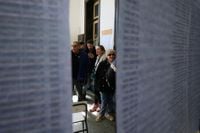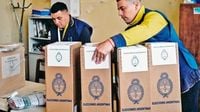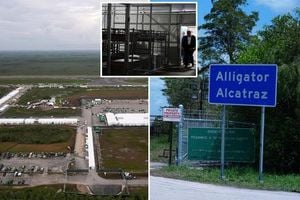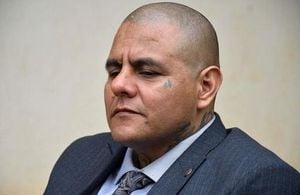On Sunday, September 7, 2025, millions of voters in Argentina’s Buenos Aires Province, the country’s most populous region, streamed into polling stations for what many analysts and politicians described as the most consequential local election in years. But make no mistake—this was no ordinary provincial contest. Instead, it became a high-stakes referendum on the turbulent presidency of Javier Milei, whose radical economic agenda and outsider persona have both captivated and divided the nation.
Buenos Aires Province, home to more than 40 percent of the national electorate and responsible for over 30 percent of Argentina’s GDP, has long been the political stronghold of Peronism—a populist movement whose influence stretches back to the 1940s. Yet this year, the contest was sharply polarized between Milei’s upstart La Libertad Avanza party and the battered but still formidable Peronist opposition, led (at least in spirit) by the now-disgraced former president Cristina Fernández de Kirchner. According to AP, the results would offer a crucial bellwether for the upcoming national midterm elections scheduled for late October.
“These elections will be useful to understand the level of support that the government has but also how strong the Peronist party is, especially ahead of October midterms where the government needs a good result to push its reforms,” said Juan Cruz Díaz, head of the Buenos Aires-based consultancy Cefeidas Group, as reported by AP.
For President Milei, 54, the stakes could hardly have been higher. Since taking office two years ago, the former TV pundit has pushed through steep government spending cuts, hoping to transform Argentina’s reputation as a serial defaulter into that of a disciplined, investment-friendly nation. He’s been nothing if not bold, slashing social programs and insisting that “the state has to have a minimal impact and investments have to come from the private sector,” as political analyst Ana Iparraguirre told AP.
But the economic pain has been real. According to Bloomberg and Buenos Aires Times, the cost of living has surged, unemployment is up, and interest rates have soared to record highs. While annual inflation has dropped dramatically—from a staggering 87 percent in the first seven months of 2024 to just 17.3 percent over the same period in 2025—the government’s deep spending cuts have left many Argentines struggling. Consumer confidence is down, economic growth has sputtered, and investors have begun selling off sovereign bonds, wary of the country’s ability to service its debts.
To make matters worse, Milei’s administration has been rocked by a series of corruption scandals. Most damaging has been the bribery allegations swirling around his sister and chief-of-staff, Karina Milei, who is accused of taking kickbacks from pharmaceutical contracts and at the ANDIS national disability agency. Milei has flatly denied the charges, but the optics have been disastrous for a president who built his brand as a crusader against the “corrupt Peronist elite.”
The political fallout has been swift. Just four days before the election, Argentina’s opposition-dominated Congress overrode Milei’s presidential veto for the first time, enacting a law that declared an emergency for the disabled and granted additional funds to this vulnerable group. Congress also approved increased funding for healthcare and universities, signaling growing resistance to Milei’s austerity drive. As Buenos Aires Times noted, “the government approaches Sunday’s election more battered than it expected two months ago, but with a strategy that remains effective for them: polarisation with Kirchnerism and the opposition, between the past and the future.”
Despite the headwinds, Milei’s La Libertad Avanza party entered the contest with some wind in its sails. The party, barely four years old, has managed to absorb much of the center-right, including the PRO party of former President Mauricio Macri. The Peronists, meanwhile, have struggled to maintain unity, their leadership in flux after Fernández de Kirchner’s lifetime ban from politics and house arrest for corruption. The party’s future direction remains uncertain, with no clear vision beyond opposition to Milei and a reliance on the same patchwork of price controls and cash handouts that many blame for the current crisis.
According to AP and Buenos Aires Times, the election would not directly change national policy or affect the composition of Congress, which faces its own renewal in October. But it would send a powerful signal to investors and politicians alike about Milei’s staying power and the prospects for his radical economic reforms. The ruling party currently holds just 12 of 92 seats in the Buenos Aires Province Legislature, so even a modest gain would be significant. However, as political analyst Marcos Novaro warned, “if the government were to lose by more than five points, the markets will react sensitively, things with the dollar will get heavier, and the road to October could become complicated.”
Polling stations opened early Sunday morning and closed at 6 p.m. local time, with both main parties awaiting results in La Plata, the provincial capital. Most polls forecast a close race, with a slight edge for the Peronists and the possibility of high voter abstention. The mood on the ground was tense, with many voters expressing frustration at the lack of appealing options. “Right now, people don’t have a lot of options in front of them,” Iparraguirre observed. “They may be disillusioned with Milei. But they don’t know where to go.”
Meanwhile, the government’s recent intervention in the currency market—selling dollars from the Treasury to prop up the peso—marked a dramatic shift from Milei’s free-market rhetoric and could complicate ongoing negotiations with the International Monetary Fund. The administration’s inability to build up sufficient foreign currency reserves has also raised red flags among global investors, who are looking for signs that Argentina can finally break its cycle of debt crises.
For the Peronists, the election offered a glimmer of hope. With the economy sputtering and corruption scandals mounting, many in the movement believed they could capitalize on public discontent and reclaim their traditional base. Yet, as history has shown, Argentine politics is rarely straightforward. The shadow of Juan Domingo Perón, the army general who first built his working-class base in Buenos Aires Province in the 1940s, still looms large. But today’s voters, battered by inflation and scandal, seem less ideologically committed and more desperate for stability.
As the votes are tallied, all eyes remain fixed on Buenos Aires Province. The outcome won’t change national policy overnight, but it will shape the political landscape ahead of October’s pivotal midterms—and perhaps determine whether Milei’s vision for Argentina has any real staying power. For now, the country waits, once again at the crossroads of crisis and possibility.






